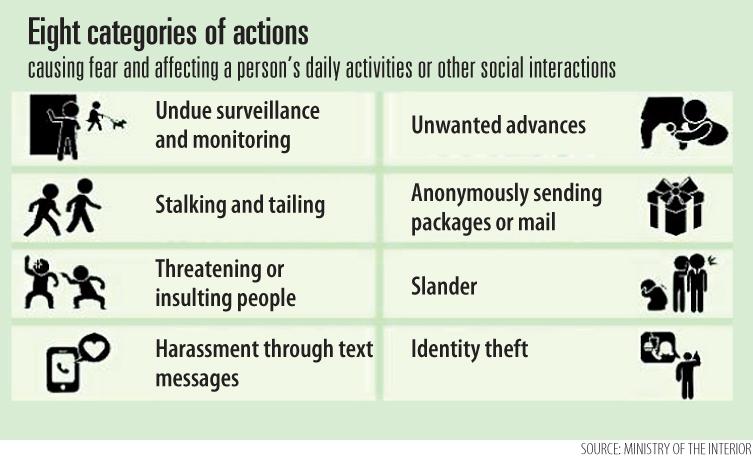Police have identified 2,734 people implicated in stalking or related crimes over the past three years, and stepped up patrols and officer training in preparation for the June enactment of a stalking prevention law.
After years of debate, the Legislative Yuan in December last year passed the Stalking and Harassment Prevention Act (跟蹤騷擾防制法), which is to go into effect on June 1.
Earlier in 2019, the National Police Agency instituted a plan to combat stalking, which included compiling monthly data on cases at risk of repeat offense.

Photo courtesy of the Ministry of the Interior
The agency said that 2,734 people were implicated in stalking or related crimes between July 2019 and December last year.
Of those, 1,543 cases (56.4 percent) were classified as sexual harassment, while 619 (22.4 percent) were cases of domestic violence, although those cases after January 2020 were reclassified as a more serious criminal offense under the Domestic Violence Prevention Act (家庭暴力防治法) and therefore are no longer included in the agency’s stalking statistics.
About 8.7 percent, or 239 people, were implicated over contraventions of criminal law, such as coercion, indecent exposure, assault or offenses against privacy.
The agency also found 189 cases of workplace discrimination, 76 contraventions of social order — such as stalking “without justifiable reasons,” peeping or other unexplained harassment — and 59 cases of discrimination under educational law.
Under the new law, stalking is defined as behavior intended to repeatedly exert “anything sexual or gender-related toward a specific person against his/her will, which intimidates such specific person and sufficiently affects his/her daily life or social activities.”
It also lists eight activities that would constitute stalking.
Under the new law, police are authorized to issue a protective order if an initial warning is ignored within two years. A perpetrator could then be arrested if the order is contravened, with the option for preventive detention if approved by a court.
To ease the transition when the new law goes into effect, the agency said it would continue following its 2019 plan, and advise precincts on how to handle cases under current and future laws on an individual basis.
It also vowed to review incident hotspots and times of day when reports are made, and step up patrols accordingly, while also expanding regular patrols to include known harassers.
Since there is considerable overlap of domestic violence, social order, harassment and other types of incidents, the agency said it is working to improve officers’ familiarity with the new law and when to apply it.
For example, in New Taipei City, the number of sexual harassment cases decreased by nearly 10 percent between 2020 and last year, while the number of related criminal offenses such as coercion and obstruction of freedom increased by 11.3 percent, the agency said.
This shows that officers are gaining a better understanding of the nature of stalking and harassment, it said.
Officers’ newly instituted ability to issue protective orders and pre-emptively detain perpetrators is also expected to greatly reduce incidents and “fill in the last piece of gendered violence prevention,” it added.
Additional reporting by Hsu Kuo-chen

Taiwan has received more than US$70 million in royalties as of the end of last year from developing the F-16V jet as countries worldwide purchase or upgrade to this popular model, government and military officials said on Saturday. Taiwan funded the development of the F-16V jet and ended up the sole investor as other countries withdrew from the program. Now the F-16V is increasingly popular and countries must pay Taiwan a percentage in royalties when they purchase new F-16V aircraft or upgrade older F-16 models. The next five years are expected to be the peak for these royalties, with Taiwan potentially earning

POSITIVE DEVELOPMENT: Japan and the US are expected to hold in-depth discussions on Taiwan-related issues during the meeting next month, Japanese sources said The holding of a Japan-US leaders’ meeting ahead of US President Donald Trump’s visit to China is positive news for Taiwan, former Japan-Taiwan Exchange Association representative Hiroyasu Izumi said yesterday. After the Liberal Democratic Party’s landslide victory in Japan’s House of Representatives election, Japanese Prime Minister Sanae Takaichi is scheduled to visit the US next month, where she is to meet with Trump ahead of the US president’s planned visit to China from March 31 to April 2 for a meeting with Chinese President Xi Jinping (習近平). Japan and the US are expected to hold in-depth discussions on Taiwan-related issues during the

‘LIKE-MINDED PARTNER’: Tako van Popta said it would be inappropriate to delay signing the deal with Taiwan because of China, adding he would promote the issue Canadian senators have stressed Taiwan’s importance for international trade and expressed enthusiasm for ensuring the Taiwan-Canada trade cooperation framework agreement is implemented this year. Representative to Canada Harry Tseng (曾厚仁) in an interview with the Central News Agency (CNA) said he was increasingly uneasy about Ottawa’s delays in signing the agreement, especially as Ottawa has warmed toward Beijing. There are “no negotiations left. Not only [is it] initialed, we have three versions of the text ready: English, French and Mandarin,” Tseng said. “That tells you how close we are to the final signature.” Tseng said that he hoped Canadian Prime Minister Mark Carney

STAY IN YOUR LANE: As the US and Israel attack Iran, the ministry has warned China not to overstep by including Taiwanese citizens in its evacuation orders The Ministry of Foreign Affairs (MOFA) yesterday rebuked a statement by China’s embassy in Israel that it would evacuate Taiwanese holders of Chinese travel documents from Israel amid the latter’s escalating conflict with Iran. Tensions have risen across the Middle East in the wake of US and Israeli airstrikes on Iran beginning Saturday. China subsequently issued an evacuation notice for its citizens. In a news release, the Chinese embassy in Israel said holders of “Taiwan compatriot permits (台胞證)” issued to Taiwanese nationals by Chinese authorities for travel to China — could register for evacuation to Egypt. In Taipei, the ministry yesterday said Taiwan